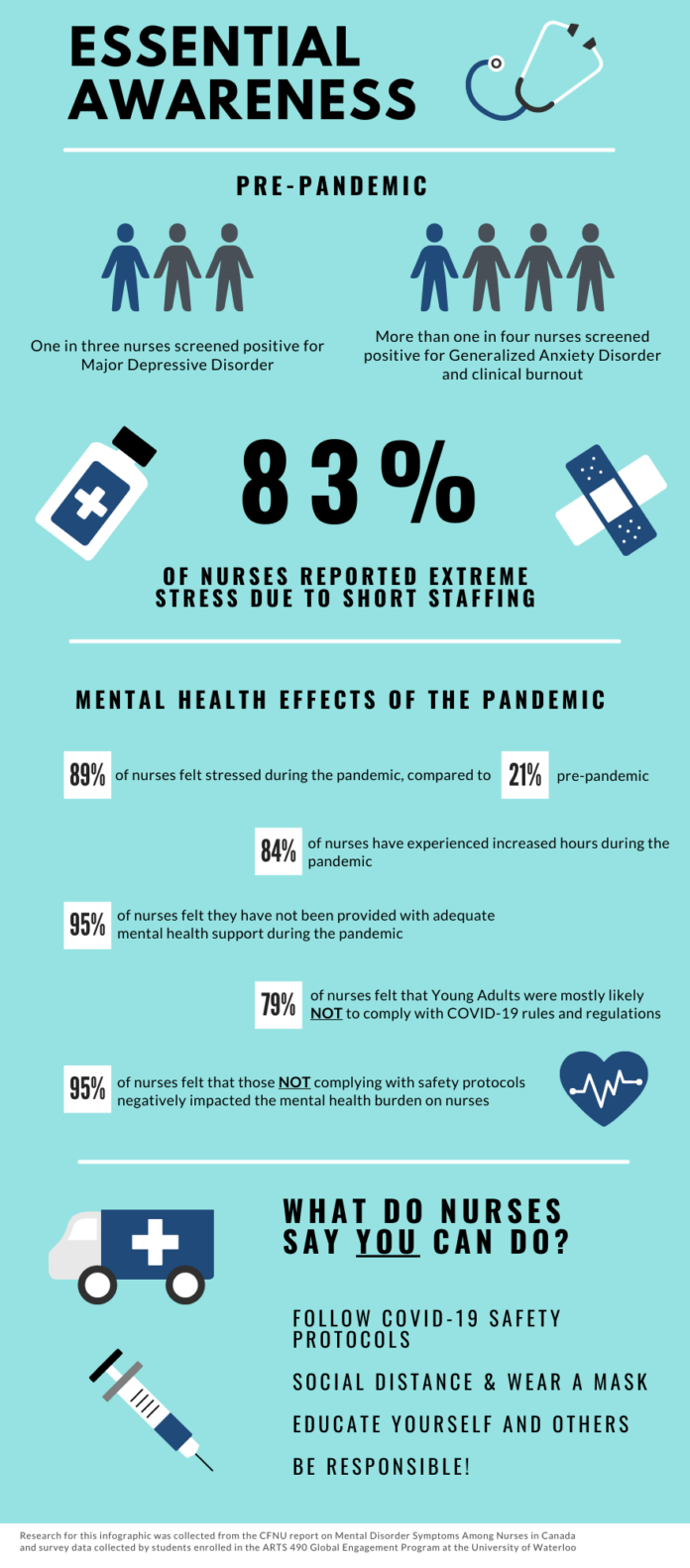As the pandemic continues to affect everyone’s lives, it is evident that the lives of frontline healthcare workers such as nurses, doctors and first responders have been hit the hardest. In recognition of this, UW students began a research project in the beginning of January in association with the ARTS 490 Global Engagement project, to investigate the impact of COVID-19 on the mental health of nurses.
“With the COVID-19 pandemic, a lot of the nurses and health care workers in general – have been experiencing a lot since the beginning of the pandemic; and as a group, we kind of wanted to look into their experience during the pandemic,”said Selena Bahta, a group member.
Their findings came back showing that the mental health of nurses were in fact negatively impacted by the COVID-19 pandemic. When comparing the responses to how stressed they were before and after the pandemic, almost all responses came back confirming that COVID-19 has increased stress among nurses. Furthermore, the data shows that there is inadequate mental health support for nurses during these challenging times, as over 90 per cent of the responses came back supporting this claim as well as over 80 per cent saying their work schedule changed drastically to accommodate for the large inflow of COVID-19 patients. According to the data, the nurses also believe that the population is not complying with COVID-19 rules and regulations, especially the young adult age group.
“We know we’ve kind of contributed to a lot of the COVID-19 cases, our group is having a harder time complying with COVID-19 protocol and stuff like that. So we chose for our target group to be nurses, but also to kind of target the undergraduate population,” said Selena Bahta, a member of the group.
According to the group members Selena Bahta, Lea Victoria Gamas, Navjeet Kaur Ubhi, Fathima Marfath Kamoordeen, and Daniyal Syed Naumani, the research was carried out using surveys created by SurveyMonkey to collect their data. These surveys were sent out to nurses in the GTA, where responses were collected anonymously to examine the shared experiences of nurses during the pandemic.
“[The 10-question survey sent to nurses] asked what age group they thought were contributing the most to spreading the virus amongst seniors, adults, and young adults,” said Lea Victoria Gamas, one of the researchers. “At the end of the survey, we asked them what they think the general population could do to minimize the mental health burden that they’re dealing with.”
To assess their results and measure their outcomes, researcher Fatimah Marfath Kamoordeen said additional statistical analyses will be conducted. “We’re going to look at numbers, probably do stats graphs. We already know that the nurses are going to say that they’re having a hard time…but I think our goal with this survey is to prove that point,” Kamoordeen said.
“We could use this information and data just to show everyone, specifically the younger population in Waterloo, that nurses are in fact going through a lot and how we could support them. We’re hoping that with this information, we could spread that awareness once again and be like, “Hey, this is something you can actually do to help people out,” Navjeet Kaur Ubhi, a member of the group, said.
Regarding limitations and strengths in their research, the team members reflect that their short time frame from brainstorming in the beginning of January 2021 to conducting their research in March, was a major barrier they had to overcome. Furthermore, dealing with privacy issues was a challenge in collecting their data. Additionally, they mentioned that as students, their resources are limited, which created barriers in their results as well as their reach.
“Although the surveys were anonymous, there are people who are still uncomfortable with giving out certain information. There is also a limitation to our reach, for example, actions that could [influence] the government, but hopefully someone gets someone who cares and gets motivated,” Ubhi said.
With the evidence garnered from this research, the group hopes to turn the conversation back to supporting our frontline health workers, as well as continue to emphasize the seriousness of the pandemic. Especially in calling upon the UW community, the group urges students to take precautions in following COVID-19 protocols and minimizing social gatherings.
“Hopefully, our research will help nurses in this sort of setting – and obviously, this sort of change doesn’t happen overnight, – but [it will help] to just start talking about it again. I don’t think that it’s talked about enough- how important nurses are, and while they do care for others, they need to be cared for as well,” Navjeet said.






























